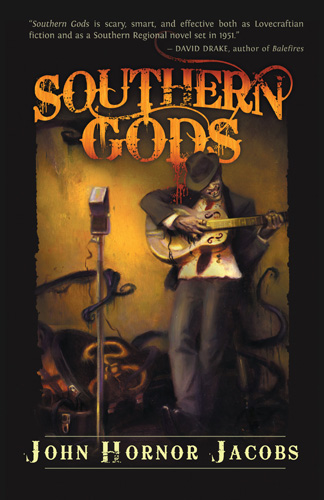Sep. 6
1:27 PM
Going South—John Hornor Jacobs’s debut novel SOUTHERN GODS
Not a lot of people get the South right. We either get a romantic, bucolic view of the South as a place of genteel tradition, good manners, and natural beauty, or we get a vision skewed sharply in the other direction, focusing on the poverty, the ignorance, the desperation, and the sheer goddamn spookiness of the backwoods and deep swamps. The truth, of course, is that the region is both of these things at once--even writers who have spent some serious time there sometimes fall into the trap of over-representing one side of the coin over the other, instead of trying to pull of the admittedly trickier but far more accurate flip of the silver dollar that shows both sides to the reader at once, a gleaming, bright vision of a place unlike any other. Nowhere does John Hornor Jacobs's talent shine so sharply as in his descriptions of the South--the pages almost curl under your fingers from the humidity, and the imagery is as simultaneously brilliant and shadowy as sunset on the bayou. This powerful ability makes his omission of certain other elements of the time and place a bit disappointing, but more on that later.
Southern Gods is one hell of a debut. Jacobs takes us outside of the dusty universities, strange cities, and benighted hollows of New England, where Lovercraftian weirdness is more commonly found, and into a wholly different region: Arkansas in the early fifties. Incorporating jewels from Chambers's King in Yellow stories (and those of his literary descendants), Jacobs places them into a pulp noir setting with fine result. A mysterious bluesman by the name of Ramblin' John Hastur is making waves with his sinister tunes being broadcast from a pirate radio station, and it's up to a WWII vet to track him down. If that premise doesn't grab you, the impressive writing will, for Jacobs knows how to turn a phrase with elegant simplicity--the very first line is "The black thing walked from the forest and took the shape of a man." Goddamn.
The first half of the novel fulfills the promise of that premise, and then some--our hero, Bull Ingram, is a man on a mission, and as he explores the backroads and bayous of East Arkansas we breathlessly ride shotgun as the tension mounts and the weirdness multiplies. Early on one begins to suspect that things will not turn out well, but Jacobs's uncompromising commitment to telling a truly unsettling tale may impress even jaded horror readers as the second half of the novel barrels along to its gruesome terminus. Personally, I found the concluding segments a touch less engaging than what came before it, but that's one of the perils of the genre--what we don't know tends to transfix us more than what we do.
I was also hoping Jacobs would do more with race, considering the time, place, and cast. Alice, a black woman, is far more interesting than Sarah, her white friend and employer, but early on it becomes apparent that Alice has supporting duties while Sarah becomes one of the main protagonists, alongside Bull Ingram. Due to sloppy reading on my part, I initially thought Bull was a black man, which would have been another interesting decision, especially in light of the relationship Bull develops with Sarah. When I realized I'd misread something and that Bull was a white dude the book lost a bit of tension for me--a solitary black man poking around the rural South at that time was in a much more precarious position than a white one.
Now, I'm not suggesting anything unsavory--Jacobs wrote the book that he did, and it's a damn fine one, so any bellyaching on my part about what he could have done differently is just that. He does touch on race relations at several points, and the supporting cast is a mix of black and white characters, so it's not as though the subject is wholly absent, it just seems underdeveloped considering his choice of setting and the heady questions of human weakness, ignorance, and brutality that the novel tackles.
It's also a darkly fun, fast, and furious read--quibbles aside, Southern Gods is a book that only Jacobs could have written, and is the impressive start of a promising career. And dig that sweet Nightshade layout:
